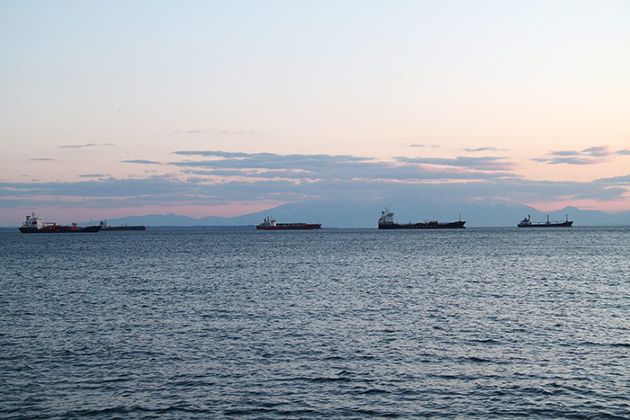-
 Greek entrepreneurship by numbers: Micro-scale and macro impact
Greek entrepreneurship by numbers: Micro-scale and macro impact
-
 Concerns about insipid public consultation process highlighted by treatment of climate plan
Concerns about insipid public consultation process highlighted by treatment of climate plan
-
 Great Expectations: Is Greece 2.0 hitting the target?
Great Expectations: Is Greece 2.0 hitting the target?
-
 Record year for Greek tourism raises concerns about sustainability
Record year for Greek tourism raises concerns about sustainability
-
 What is driving the Greek housing market's recovery?
What is driving the Greek housing market's recovery?
-
 Record FDI flow into Greece raises bar, but is it sustainable?
Record FDI flow into Greece raises bar, but is it sustainable?
Balance of payments shows shipping on course for bumper year, but economic benefits unclear

Shipping provided the one bright spot in Greece’s trade balance in May, with transportation contributing 2.16 billion in receipts, compared to 1.44 billion the same month last year, an increase of 50 pct. In the five months between January and May, transportation receipts totalled 9.2 billion euros compared to 6.4 billion for the same period in 2021 according to official figures from the Bank of Greece.
The figures are some of the highest ever recorded, suggesting that the Greek shipping sector is on course for a record year.
However, this comes during a period when Greece’s overall current account deficit widened to over 10 billion euros in the first five months of the year, an increase of 67 pct over the equivalent period of 2021. It is questionable to what degree the shipping boon will be able to counterbalance this.
Record receipts
Sea transport, including international shipping performed by ship management companies with an office in Greece, accounts for the lion’s share of transportation receipts. It made up 85 pct of the sector’s receipts pre-pandemic, in 2019. At the time it also accounted for over a third of all of service receipts, where historically it is surpassed only by tourism.
Quarterly data from the Bank of Greece shows that sea transport alone brought in receipts of 17.2 billion euros in 2021, up from 12.5 billion in 2020, and close to the biggest year on record, which was 2008 with 17.6 billion euros. Receipts in Q4 2021 hit 4.9 billion euros, making it the best quarter on record, while Q1 2022 was the strongest first quarter historically with 4.8 billion euros.
The resurgence is clearly linked to the recovery of demand after the lifting of global pandemic restrictions, coupled with the associated rise in transportation costs due to rising fuel prices. The Russian invasion of Ukraine at the end of February accelerated these trends further, sparking a rise in leasing prices and adding to insurance costs.
The same forces can be seen at work in transportation payments, which rose by 50 pct YoY in the first five months of 2022 to a total 7.5 billion euros compared to 6.4 billion the same period of last year. Sea transport payments specifically increased by 59 pct YoY in Q1, from 1.9 billion euros in Q1 2021 to 3 billion euros, while overall 2021 was a record year with close to 11 billion euros in payments.
The Russia factor
Greek shipping has undoubtedly benefitted from the uptick in trade since the lifting of Covid restrictions and the resulting energy crunch, as well as from the more acute energy crisis which has followed the Russian invasion of Ukraine and the sanctions on Russia.
According to the Union of Greek Shipowners, the Greek-owned fleet accounts for just over a third of oil tankers by volume globally, as well as over 22 pct pct of LNG tankers. The increase in LNG shipments following the EU’s decision to reduce its reliance on Russian gas, as well as the re-routing of oil shipments as western countries tighten restrictions on Russian oil have increased the demand for shipping services.
Somewhat controversially, many Greek shipowners continue to ship oil exports from Russian ports. Tanker traffic data shows that after the invasion of Ukraine, Greek shipowners increased their share of oil shipments from Russia as other European shipping nations withdrew. Data collected by the IIF’s Robin Brooks and Jonathan Pingle, as well as Greek investigative site Reporters United, shows that half of Russian oil transported by tankers since the Ukraine invasion was carried by Greek-owned tankers.
The Greek government, along with that of Malta and Cyprus, was instrumental in watering down the sanctions package on the movement of Russian oil which comes into force at the end of 2022. This means that while Greek shipowners will be more limited in the scope of the activities they will be able to undertake legitimately, the window is not completely closed even if it has been highlighted as an area of moral ambiguity.
Addressing the Greek shipping community in May, Prime Minister Kyriakos Mitsotakis made clear that, “there are no sanctions concerning Greek shipping as regards the transfer of oil from Russia to third countries”, adding that “beyond that, everyone is responsible, and he may talk to his conscience to see if he wants to be involved in such shipments of goods from Russia at the moment”.
It is not possible to gauge the impact of this particular strand of activity on the overall shipping balance from the available evidence. However, it is clear that Greek shipping has benefitted from the overall increase in demand for global fuel transport and is set to continue to do so. Sources commenting to the Wall Street Journal recently noted that while oil sanctions will reduce the opportunities for shipping from Russia, they are likely to increase demand for crude shipments from other regions, including the US, requiring longer shipping routes which will also benefit the industry.
Economic benefit
For the Greek economy the benefits are less clear-cut. The effect of the shipping boom on the balance of payments is almost symmetrical.
Over the first five months of the year, the balance of payments relating to transportation increased by 23 pct YoY, from a surplus of 1.4 billion in 2021 to 1.7 billion in 2022. The effect on sea transport quarterly figures is roughly the same, at 25 pct.
Overall, the damage to the current account deficit from the rising cost of oil imports over the same period has been far more significant. The oil balance deficit almost tripled from 1.4 billion in 2021 to 4.3 billion in 2022.
It also remains unclear how large a contribution the largely offshore-based shipping sector makes to the national economy. While the shipping industry claims that the sector contributes in the order of 6-7 pct to national GDP, alternative analyses suggest that the added value of shipping activity to the real economy is more likely to be a fraction of that (the key issues are raised here and here).
The contribution to state revenues also remains to be seen, though thanks to the preferential tax treatment afforded to the shipping sector it is not expected to be significant. Tonnage tax, which is independent of profitability, is estimated by a Bank of Greece study to have yielded the state a relatively insignificant 15 mln euros annually in recent years.
On top of this, there is a voluntary contribution by Greek shipowners – a crisis-era concession by the shipping community which is periodically renewed through an agreement with the state. In the past week, the Union of Greek Shipowners has decided to raise its annual minimum contribution from 40 million euros to 60 million. At the same time, however, it is lowering the contribution rate on income from dividends, from 10 pct to 5 pct, which suggests that some of the upside will not be passed on.
 Current account deficit for Jan-Feb at 4.12 bln, significantly higher than 2021
Current account deficit for Jan-Feb at 4.12 bln, significantly higher than 2021  Travel balance back to normal, but Apr C/A deficit of 1.62 bln impacted by goods deficit
Travel balance back to normal, but Apr C/A deficit of 1.62 bln impacted by goods deficit  Despite improvement in services, goods tip current account to deep deficit of 2 bln in May
Despite improvement in services, goods tip current account to deep deficit of 2 bln in May